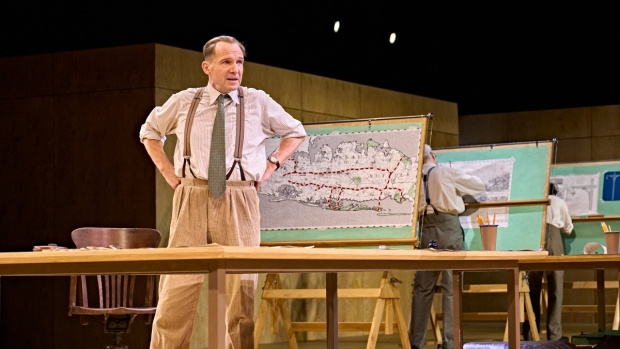Straight Line Crazy starring Ralph Fiennes at the Bridge Theatre – review
David Hare’s new play runs until 18 June

© Manuel Harlan
With their god-like belief in their own powers to solve all society's problems, architects make surprisingly good subjects for drama whether it is in Ayn Rand's disturbing The Fountainhead, inspiration for so much quasi fascistic thinking or JG Ballard's futuristic High-Rise where a disintegrating building becomes an image of society.
Six years ago, Ralph Fiennes took on Ibsen's delusional The Master Builder in an adaptation by David Hare at the Old Vic. Now Hare has cast him as the central figure in his new play about Robert Moses, the urban planner whose vision of state parks, straight roads and gleaming new buildings transformed New York from the 1920s to the 1960s.
His is a huge and controversial life to tackle, and Hare centres his arguments on two key moments in Moses's long career, one a success of sorts and one a failure. In the opening act, we see him in 1926 driving through his plan to open up Long Island, changing it from a playground for the established families such as the Vanderbilts and the Whitneys into a recreational amenity for the "people", in whose name he claims to act.
In the shorter second part, he tries to drive a highway through Washington Square in Manhattan and is thwarted by a mass protest by local residents, interested both in conservation and in protecting their homes and their lives from the onslaught of the car.
Both halves are very talky and rely a lot on Moses's conversations with his idealistic office assistants, who are often required to do very little other than stand around and provide cues for another chunk of exposition. But the excellent Siobhán Cullen and Samuel Barnett endow them with life, fire and character and Hare provides them with lively, scalpel-edged dialogues.
Through these speeches, presented on Bob Crowley's plain but effective set, dominated by a long line of drafting tables and ranks of drawing boards covered in plans, Hare covers a lot of ground – not just Moses' own history, but also questions of democracy, of whose job it is to safeguard the interests of all the people. Moses claims: "The people lack imagination; it's the job of the leaders to provide it" and constantly positions himself as the strong, infallible visionary who can set himself above the law because he knows best. He sees America's capitalist growth as intimately linked with its constant desire for change.
It's stirring, engrossing stuff, smoothly directed by Nicholas Hytner, purring along at pace, and full of thought-provoking observations. The high point comes when Danny Webb's Governor Al Smith, comes calling. He's the politician whose popularity and faith enables Moses to carry out his schemes, and he takes it hard that the planner has gone ahead with his road-building without permission. "On the side of the angels and using the methods of the devil," he says.
Webb's energy, his sheer sense of inhabiting this cigar-chomping, bourbon-drinking charmer, lights up the stage, and prompts Fiennes' Moses into his most vibrant and engaged debate. In general, perhaps because he is so often explaining himself without a real opponent, this is one of Fiennes' more mannered performances, full of muscular gestures (arms crossed, legs astride) and quicksilver changes of pace.
The second half loses this electricity as it jumps forward 30 years. There's just too much ground to cover as Moses' reputation comes under increasing attack – particularly for his tendency to bulldoze Black neighbourhoods in order to build his roads, and his favouring of the wealthy rather than the masses in whose interests he claims to act. There's also his obsession with cars, and refusal to build mass transit systems, not to mention his alcoholic wife and the sadness of his life. Issues of gentrification suddenly sneak into the conversation.
Alisha Bailey makes a considerable impact as the assistant who refuses to fall under the master builder's spell, but poor Helen Schlesinger can't make much of the role of Jane Jacobs whose vision of the city as a living, messy place is in direct contrast to Moses's own, but who never gets beyond spouting aphorisms. You never see Moses meet the protestors whose vision ultimately derails his own. For a drama built on conflicting ideas, it feels like a cop-out.












